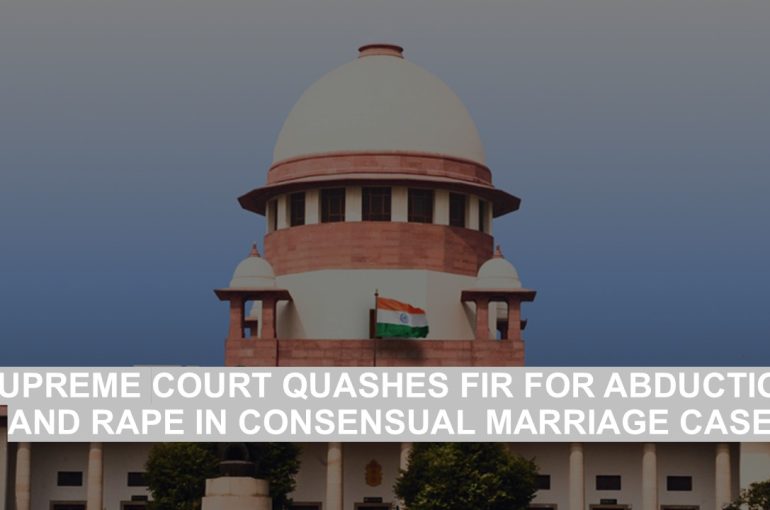SUPREME COURT QUASHES FIR FOR ABDUCTION AND RAPE IN CONSENSUAL MARRIAGE CASE
The Judgment in the Case of Kuldeep Singh v. State of Punjab & Ors., Criminal Appeal arising out of SLP (Crl.) No. 13277 of 2023, was delivered by a Division Bench of the Supreme Court of India, comprising Hon’ble Justice Vikram Nath and Justice Prasanna B. Varale, on January 31, 2025. This case deals with the validity of an FIR for abduction and rape against a man who claimed to have legally married the victim, with the Court ultimately quashing the proceedings due to lack of evidence and the application of marital rape exception. It addresses the legal implications of a consensual marriage and the charges under IPC.
Brief Facts of the Case
The case revolves around an FIR (No. 148 of 2022) filed by Respondent No. 2 (cousin of Respondent No. 3) alleging that the victim (Respondent No. 3), who was employed at the National Insurance Company, had been abducted by the Appellant, Kuldeep Singh, on June 13, 2022. However, the Appellant contended that he and Respondent No. 3 had legally married on June 15, 2022, in accordance with Sikh rites, despite opposition from her family. Subsequently, the couple approached the High Court through CRWP No. 5913 of 2022, seeking protection, which was granted on June 21, 2022. Later, on August 31, 2022, the victim returned to her parental home, and on September 1, 2022, she accused the Appellant of rape and forced marriage in a statement recorded under Section 164 Cr.P.C.
Issues Raised:
- Whether the FIR under Sections 366, 376, and 506 IPC was valid given that the Appellant and Respondent No. 3 were legally married.
- Whether the charge under Section 376 IPC could be sustained in light of Exception 2 to Section 375 IPC (which exempts sexual intercourse between a husband and wife from the definition of rape).
- Whether the criminal proceedings should be quashed in the absence of any prima facie case against the Appellant.
Contentions by both Parties
Appellant (Kuldeep Singh)
The Appellant argued that the marriage was consensual, negating any offence under Section 366 or Section 376 IPC. He emphasized that Respondent No. 3 had previously sought protection from her family and had never alleged rape in her written statement during the restitution of conjugal rights proceedings. Furthermore, he relied on Exception 2 to Section 375 IPC, which states that a husband cannot be charged with rape in a legally valid marriage.
Respondents (State and Complainant)
The Prosecution initially claimed that the Appellant had kidnapped the victim and forced her into marriage. However, based on the victim’s later statement, additional charges under Sections 376 and 506 IPC were included. The High Court dismissed the Appellant’s petition under Section 482 Cr.P.C., ruling that the matter required trial.
Supreme Court
The Supreme Court observed that the Special Investigation Team (SIT) had found no evidence of forced marriage or abduction. As the marriage was consensual, the charge under Section 366 IPC was dropped, leaving only Sections 376 and 506 IPC. Considering Exception 2 to Section 375 IPC, the Court ruled that no charge of rape could be sustained. Additionally, the failure of Respondents No. 2 and 3 to appear before the Court further indicated that the allegations lacked substance. Consequently, the Supreme Court set aside the High Court’s order and quashed the FIR along with all related proceedings.
Conclusion
The appeal was allowed, and FIR No. 148 of 2022 was quashed. The Court reaffirmed that in the absence of a prima facie case, continuing criminal proceedings would serve no purpose.
Please log on to our YouTube channel The Indian Lawyer Legal Tips and learn about different aspects of the law. Our latest video is on “Law on Ancestral Property” that may be viewed on the link below:
Baddam Parichaya Reddy
Associate
The Indian Lawyer & Allied Services





































Leave a Reply